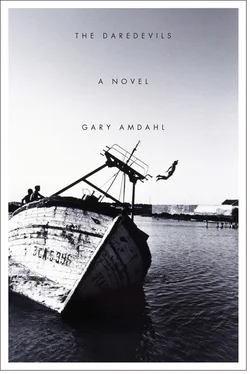“I did indeed! I was caught up in your wacky world of no cause and no effect, thinking, hoping against hope, that I saw causes anyway, and believing I could produce effects.”
“What does Father say?”
“He says not a whole lot. He says — murmurs — that the jig was up when he saw a company he partly owned wasn’t going to be able to deliver water to our burning little city.”
“He also partly owned one of those French restaurants,” said Amelia.
“The Poodle Dog, yes,” said Andrew.
“And had affairs with several women there.”
“And you’ve never forgiven him,” asked Andrew, “is that right?”
“I have not. Why should I? He destroyed Mother’s will to live.”
“Sweetheart, you know very well why you should forgive him.”
“ I forgive him .”
“Good.”
“How has the world changed? How has anything changed?”
“Oh, it’s changed, all right,” said Charles. “It’s changing and it won’t stop. Were you expecting applause or a paycheck for your act of forgiveness?”
“Of course I was!”
“Many actors do.”
“He says a man,” said Andrew, “who runs a newspaper called the Minnesota Mascot —”
“Björnsen,” said Charles. “Speaks for ascending Scandinavian Lutheran farmer-businessmen at odds with the small-town elite.”
“Sounds right. Father saw him as the kind of man he saw in Fremont Older and the other Regenerators in the newspaper business, in the Golden Age of Graft. You know what I mean: someone who wasn’t afraid to say startling, painful truths out loud and damn the consequences.”
“One quick note?”
“Go ahead.”
“The consequences are quite different if you don’t have someone like Father approving your truth-telling.”
“Granted. And maybe that’s what Father is seeing now.”
“All right. Tell me more about what you see him seeing.”
“How wonderful Mother has been nearly all the decades of his life?” asked Amelia.
“It’s interesting, Amelia, how you can champion poor Mother who did little more than tell you to shut the fuck up all your life.”
“Shut the fuck up, Charles.”
“Well said, Amelia! Do you feel an exquisite relief?”
“Brava!” shouted Gus.
“Brava!” shouted Tony.
“No, I feel perfectly awful. I’m sorry, Tom.”
“We live,” said Pastor Tom, “around the table at which we have been seated!”
“Because Father thought he knew the sort of man who was in effect talking to him — I mean Björnsen — he was inclined to trust him, believe what he was saying, take it to heart, however you want to put it, and he thought he saw the hollowness of Progressivism, and by extension, the racism and xenophobia in populism, the hypocrisy of, of. of the Regenerators, of himself, the tyranny of power that runs under even the most admirable social and political ideas. On what flimsy pretexts that admiration is founded.”
“Even the most admirable applications of Christian ethics?”
“Yes.”
“Aha!” shouted Charles, looking at Amelia.
“Shut the fuck up, Charles,” said Pastor Tom. But he was smiling.
Charles ceased to smile. “So it’s an instance of, a variation on, say, the Timon of Athens transformation? Generous Christian Becomes Disillusioned Misanthrope?”
“Let me appear to ponder this,” said Andrew. “No.”
“No,” said Charles quietly. “I don’t suppose Father could ever become. misanthropic. The Old Poker Player probably saw that Progressivism was just a card for shrewd, energetic men to play but that the game was over because it had ceased somehow to be the great hand it had been only moments before.”
“You see, Vera,” said Andrew, addressing her singly and most earnestly — almost ardently, “he came to his principles naturally. As did Colonel Roosevelt.”
Charles laughed shortly, mirthlessly.
“Who does not?” asked Vera.
“Yes, you’re right. What I meant to say is, his political principles appeared, to him and to the people around him as he was developing them, to come directly and immediately from his goodwill and generous nature, from virtue, Christian virtue, I suppose, but virtue nevertheless.”
“Why,” asked Vera, “did it take him so long to see through that shimmering surface? Was he hypnotized? I apologize if I seem cold. Ungenerous. But I really do not understand. Evil and suffering are readily apparent. Ignore it? Sure. But fail to recognize it? I don’t think so.”
“I think he recognized it and wanted to believe that it was. nothing if not changeable.”
“Excuse me: I misspoke. I meant the hypocrisy must have been—”
“Excuse me, Vera,” said Amelia. “I’m sure the hypocrisy was as evident as the suffering and the evil. But when you are predisposed to see the good, you may be chagrined at instances of hypocrisy and worse but want more than anything else to shrug it off and—”
“He has sinned,” said Andrew. “He sees at last that he has sinned. I am not making fun. I am dramatizing because that appears to be in the family blood along with everything else. Dramatizing genuine religious conviction being reborn. He has sinned. That is to say, he has missed the mark. He now repents. That is to say, he is thinking again.”
“And,” said Charles, even more quietly, “I imagine the physical experience of his life has vitiated his will to. think differently. I mean. he must be very tired.”
Amelia’s eyes filled with tears and she murmured indistinctly.
“Yes,” said Pastor Tom, “we are all very tired. So tired, sometimes, that we wish for a sleep like death.”
“A deathlike sleep,” Charles murmured only slightly more distinctly than had Amelia. “A sleep-like death.”
“Mother and Father have both aged quite a lot in the last year. Al looks very bad. And as selfish as it is for me to say so, I feel very bad. I have always looked to Father for guidance and support. I never had a problem doing that. Not looking to him for guidance and support would have been a problem. But that never happened. If I seemed too lighthearted sometimes for that sort of attitude, that sort of dependence, if I worked my mouth. over-joyously sometimes — like certain others here today, I won’t name names, it’s in the blood, I guess — it was because I felt free and easy and confident. I was happy to carry on what I always thought of as ‘Father’s work.’ Maybe that was work of expiation for his part in the Spring Park Water disaster, maybe it was something else, I’m not sure. It certainly didn’t start out that way, before the quake and the fires, it wasn’t that way in Arizona, but it may have become that. I say again I’m not at all sure. Maybe when I say that Al looks bad and Mother and Father look old I’m completely wrong. Maybe Al looks great and Mother and Father have never been more perky, vigorous, healthy, wealthy, wise. Maybe I am only talking about myself. I’m not stupid. I know that could easily be the case. I’ll even go so far as to say that’s probably the case. No, tell you what: that is the case.”
“Mother and Father,” said Amelia, with the strange breeziness that had alarmed everybody who knew her all her life, “will be dead before the year is out.”
“Excuse me. I must be rude and cold again. Inexcusably so, but I beg your pardon anyway. I don’t know Mother or Father or any of you around this table except Charles. I will be even more frank and revealing and come, I hope, swiftly to my point. I don’t want to know any of you. I know and love Charles almost against my will. Maybe that’s the nature of that kind of love. I don’t know. But you can’t have been awake while you were manipulating the kind of power you have, or had — and very likely will have in the future if you are honest with yourselves! — and not seen at first hand everywhere you looked the sacrifice of public good for personal power or wealth! You may very well have lied to yourselves about your determination to change things, but all the while you were cultivating power, were you not? Because to change things you must have power, must you not?”
Читать дальше












